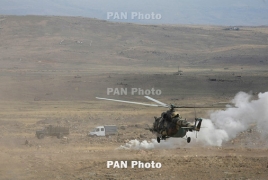Stratfor: Chances of resumption of Karabakh hostilities high March 4, 2017 - 12:43 AMT PanARMENIAN.Net - Russia holds the key to unlocking the Nagorno Karabakh dispute, although its motives are driven as much by its desire to retain its dominant regional status as to resolve the issue, according to the report released by American analytical center Stratfor. As the report notes, no progress has been made in Russian-mediated talks over the NKR conflict, and as this year progresses, chances of a resumption of hostilities between the two countries will remain high. “Azerbaijan intends at the very least challenge the political and security status quo of the breakaway territory. Armenia's goal for the territory is the inverse: to maintain the current situation. The unbending positions of Armenia and Azerbaijan have created deadlock in negotiations, but there is a crucial third player to take into account: Russia. Though the positions of Armenia and Azerbaijan are clear, the motivation for Russia in the conflict is much more complex,” the report said. According to the report, in a broader sense, Russia's primary interest in Armenia and Azerbaijan - and along the entire former Soviet periphery - is to keep foreign influence out and entrench its own. The report notes that, by and large, Russia has accomplished this in Armenia. However, Moscow would like to move Baku closer into its sphere of influence, especially while Turkey is consumed with its priorities in the Middle East. The report goes on to stress that during the 2016 violence, Russia adopted a neutral stance rather than supporting its Armenian ally militarily or politically, shifting the dynamic. “Realistically, the escalation by Azerbaijan could not have proceeded without at least a quiet understanding with Russia. Although Moscow stepped in to prevent the fighting from turning into a full-scale conflict, the message was sent that Baku had more leeway in the region and that Yerevan couldn't fully rely on Moscow to guarantee its security,” the report adds. According to the report, there have been rumors and indications that Russia would like to push for a negotiated settlement, known as the Lavrov plan. Under it, Armenia would cede five of its seven regions surrounding Nagorno Karabakh to Azerbaijan in exchange for a peacekeeping force led by Russia (or perhaps the Collective Security Treaty Organization) in those territories. However, the report notes that the Armenian government would be strongly opposed to it. If Russia indeed is pushing the plan, it could explore options to overcome Yerevan's opposition. It could allow another military escalation by Azerbaijan to pressure Armenia to make concessions. Alternatively, Moscow could use its substantial political links in the Armenian government to influence a shift in Yerevan's thinking. The report states that Russia has developed close ties to several government figures (including in the foreign and defense ministries) and leaders in the political opposition who could be more amenable to seeing things Russia's way when it comes to the Karabakh issue. Both options, however, come with significant risks. Even if Russia were able to persuade the Armenian political elite to compromise on the status of Nagorno Karabakh or its surrounding territories, the Armenian public might not tolerate such a deal. “In the meantime, orchestrating or allowing another military escalation by Azerbaijan could be a more effective option for Russia, but it comes with the risk of spiraling out of control. It may even be the case that Russia wants to give Azerbaijan the impression that it is pushing Armenia for political concessions even if it is not. In that case, the Lavrov plan would represent an avenue for Moscow, which is already pursuing closer military cooperation and weapons deals with Azerbaijan, to develop closer ties with Baku without undermining the position of the Armenian government. This, too, has its risks: Maintaining the political status quo indefinitely is an untenable position for Azerbaijan, so Russia cannot continue to prolong the issue without concrete results. This is especially true since other regional powers such as Turkey and Iran — though currently distracted in the Middle East — may become more active in the Caucasus and be in a position to challenge Russia's dominance in the area down the line,” the report said. In conclusion, the report notes that Russia's position on Nagorno Karabakh is subject to fluctuations as it relates to its longer-term interest of maintaining influence in the Caucasus. Moscow's ultimate objective is to be the dominant influence over both Armenia and Azerbaijan, and it can use the conflict in Nagorno Karabakh as a means to shape its position in both countries. This will be a key factor in driving the political and security evolution of the conflict there, which is likely to become more volatile in the coming months. Six total incidents have burned 19 old-growth trees. Friday night 8 trees were torched along the beautiful main entrance. The EU does not intend to conduct military exercises with Armenia, Lead Spokesperson for EU Foreign Affairs and Security Policy Peter Stano says. Hikmet Hajiyev has said that there is no place for USAID operation in Azerbaijan any longer. A telephone conversation between Putin and Pashinyan before the CSTO summit is not planned, Peskov says. Partner news |